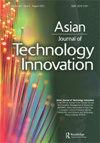Technology portfolio perspective for analyzing open innovation: insights from Iranian high-tech SMEs
IF 1.7
4区 管理学
Q3 BUSINESS
引用次数: 0
Abstract
ABSTRACTProviding evidence from less studied ecosystems contributes to the evolution of the Open Innovation (OI) theory. While previous studies investigate the pros and cons of OI in the context of developed countries, this article addresses OI adoption among high-tech SMEs in an emerging country. A multiple case study is pursued within the advanced materials sector in Iran, a sector suitable for opening windows of opportunity to a country endowed with natural resources. Thus, we deeply studied four high-tech SMEs through interviews with key managers, followed by a qualitative content analysis of the transcripts and documents. The results show that besides frequent inbound OI practices, the firms adopt several outbound OI practices. Additionally, this paper found two distinct types of OI behaviour (Selective vs. Non-selective) in relation to the firms’ technology portfolio. Although SMEs that adopt OI in both core and non-core areas are exposed to the knowledge leakage risk, due to their smallness and lack of required resources they prefer to take advantage of external cooperation, at the same time they seek ways for handling leakage concerns through trust-building. This paper has practical implications for managers who think of extending their OI practices into the firms’ core technologies.KEYWORDS: Open innovationSMEcore/ non-core technologiesemerging countriesadvanced materials Disclosure statementNo potential conflict of interest was reported by the authors.Notes1 Polyvinyl butyral film.Additional informationNotes on contributorsJavad MashayekhJavad Mashayekh, currently serves as an assistant professor at Iran University of Science and Technology (IUST). He received his doctoral degree in Management of Technology from Allameh Tabataba'i University in 2018. His research interests include open innovation, science, technology and innovation policy and, science diplomacy. He has previously published in Renewable Energy, Energies and Kybernets.Amir ZakeryAmir Zakery, has PhD in Industrial Engineering from Polytechnic University of Iran, and is currently assistant professor of Management in Iran University of science and Technology (IUST), Department of Management, Economics and Progress Engineering (from 2018). His main research interest is the Internationalization of Emerging Countries' Technology firms; which he usually follows with a knowledge-based perspective back to his background in Knowledge Management and Intellectual Capital. To complement theory and practice in this area, he has established a research unit in IUST entitled “Iran Think-tank for Export Development”. He has several publications in Journal of Intellectual Capital, Kybernetes, Technological Forecasting and Social Change, Knowledge Management Research and Practice and many other local journals.分析开放式创新的技术组合视角:来自伊朗高科技中小企业的见解
摘要从研究较少的生态系统中提供证据有助于开放式创新理论的发展。虽然以前的研究调查了发达国家背景下OI的利弊,但本文讨论了新兴国家高科技中小企业对OI的采用。在伊朗的先进材料部门进行了多案例研究,该部门适合为拥有自然资源的国家打开机会之窗。因此,我们通过对四家高科技中小企业主要管理者的访谈,对其进行了深入的研究,并对访谈记录和文件进行了定性的内容分析。结果表明,除了频繁的入站OI实践外,企业还采用了几种出站OI实践。此外,本文还发现两种不同类型的OI行为(选择性与非选择性)与企业的技术组合有关。虽然在核心和非核心领域均采用OI的中小企业存在知识泄漏风险,但由于企业规模小,缺乏所需资源,他们更倾向于利用外部合作,同时寻求通过建立信任来解决泄漏问题的方法。本文对那些想要将OI实践扩展到公司核心技术的管理者具有实际意义。关键词:开放式创新核心/非核心技术新兴国家先进材料披露声明作者未报告潜在利益冲突。注1聚乙烯醇丁醛薄膜。其他信息关于投稿人的说明javad Mashayekh javad Mashayekh,目前担任伊朗科技大学(IUST)的助理教授。他于2018年获得阿拉梅塔巴塔巴大学技术管理博士学位。主要研究方向为开放式创新、科技创新政策、科学外交。他曾在《可再生能源》、《能源》和《Kybernets》上发表过文章。Amir ZakeryAmir Zakery,伊朗理工大学工业工程博士,现任伊朗科技大学管理、经济与进步工程系管理学助理教授(2018年起)。主要研究方向为新兴国家科技企业国际化问题;他通常以知识为基础的视角来看待他在知识管理和智力资本方面的背景。为了补充这一领域的理论和实践,他在科大建立了一个名为“伊朗出口发展智库”的研究单位。他曾在《知识资本》、《Kybernetes》、《技术预测与社会变革》、《知识管理研究与实践》等刊物上发表多篇论文。
本文章由计算机程序翻译,如有差异,请以英文原文为准。
求助全文
约1分钟内获得全文
求助全文

 求助内容:
求助内容: 应助结果提醒方式:
应助结果提醒方式:


